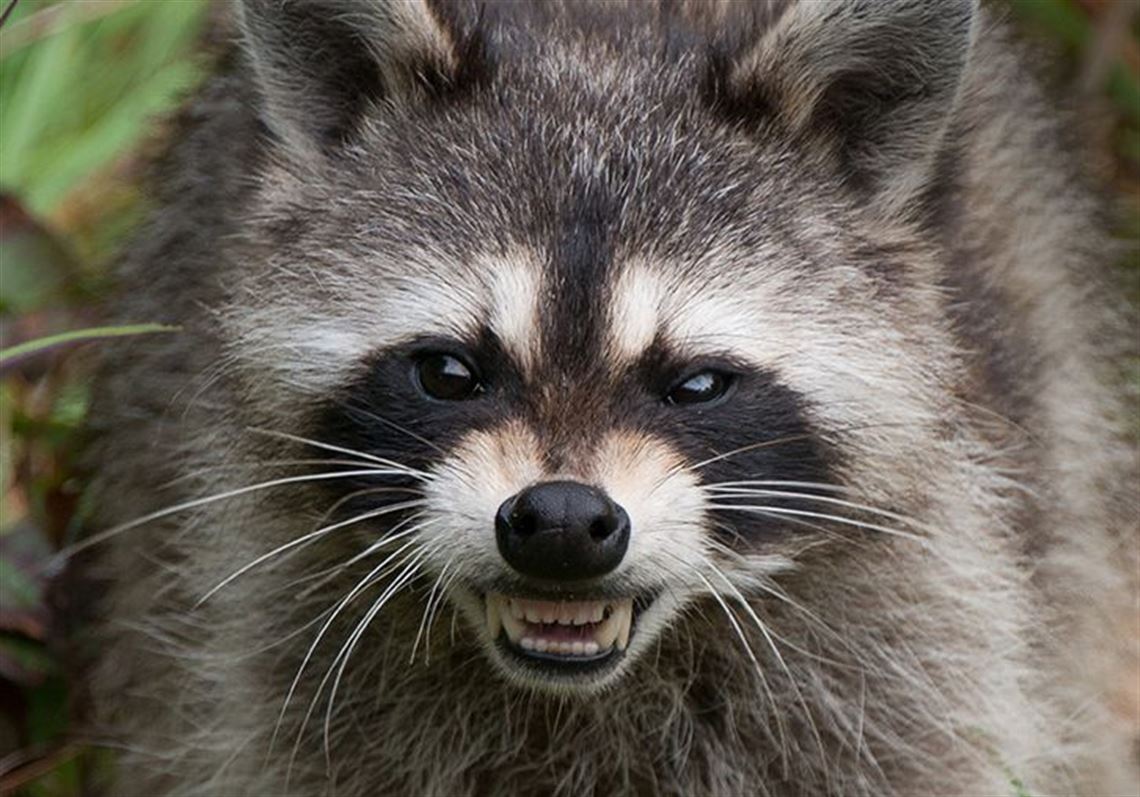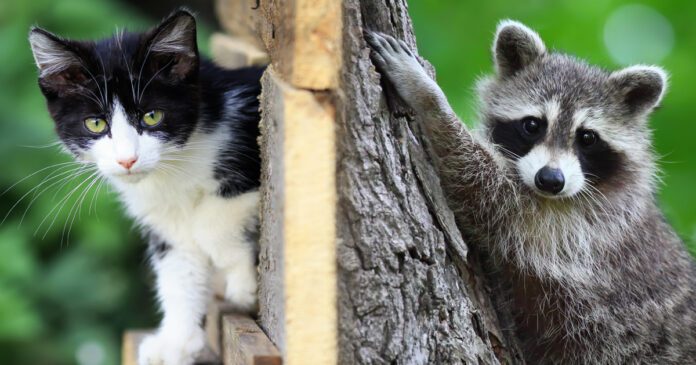Last Updated on September 17, 2021 by Fumipets
When your beloved cat comes across a night-roaming raccoon, they generally get along just fine — whether they just nod and go away, or become fast friends and share the same dish. However, there are valid reasons to keep them apart.
Friend Vs. Foe
There’s a misinformation battle going on over whether cats and coons are pals or enemies, driven by urban tales and misconceptions.
Raccoons are mostly grazers. They do kill some tiny animals, but the majority of the flesh they consume is found. They may murder kittens or tiny cats on occasion, but the evidence for those found eating dead cats is only circumstantial.
Raccoons and cats get along well in nearly all instances. Not only do they accept one other, but they also eat from the same plates, which is why animal control offices throughout the nation prohibit feeding cats outdoors. In certain places, outside feeding is even prohibited.

Social Diseases
Raccoons and cats may spread illnesses as readily as they can share food, which is unfortunate for these star-crossed animal friends. Feline distemper may be spread by raccoons (feline panleukopenia). They may potentially acquire the disease from your unvaccinated cat and pass it on to other raccoons or cats.
Worst of all, raccoons are rabies carriers. So getting your cat vaccinated is critical; keeping your kitty disease-free helps neighbourhood animals and other cats. Raccoons may also spread roundworms, which are very unpleasant and possibly deadly.
Your Cat’s Food
The majority of cat-raccoon encounters take place for food. These omnivorous scavengers find your outside cat’s food to be extremely tempting. Raccoons will keep coming back for more delicious goodies if you feed your cat outdoors and it draws them.
Allowing raccoons to eat your cat’s food, as adorable as it is to watch, is not a good idea. It is not only frowned upon by animal control agencies and, most likely, your neighbours, but it is also harmful to the raccoons. Wild creatures that grow reliant on human assistance have a harder time living on their own. Food near your home tempts them to stay and taste the contents of trash cans, gardens, and compost bins, as well as inspect your chimney and attic.
These midnight excursions may put your new friends in the way of dogs, vehicles, and others who aren’t as welcoming of nighttime marauders as you are.
Your Cat’s Door
A raccoon should never be welcomed into your house as a pet. Even if you don’t welcome them in, you might wake up one morning to discover your house has been broken into by a 20-pound criminal, or you could be confronted by an angry, scared wild animal. A raccoon entrance point is a cat door.
If you have raccoons in your neighbourhood, the best option for everyone is to bring your cat’s food inside and shut the cat door until your wild friends find a better spot to sleep at night.

Why are raccoons dangerous?
Raccoons, regardless of breed, may represent a deadly threat to your cat or kitten. These animals may not only transmit parasites and illnesses, but they can even attack your pet.
As you undoubtedly know, allowing your cat to fight with other cats may be fatal. Raccoons, on the other hand, may be deadly.
They’re bigger than the average cat, and they can easily outshine a feline’s hunting instincts.
These scary pranksters do really possess outstanding senses and hunting abilities. So, if a battle breaks out, the raccoon is likely to win.
Unfortunately, there is no ultimate solution for keeping raccoons away from your cat. If you live in an area where raccoons live, there’s a possibility your cat may come into contact with one.
Do raccoons attack cats?
Raccoons, like cats, are mostly nocturnal animals. Furthermore, their natural hunting tendencies are similar to those of your cat. It’s also conceivable that your cat may come face to face with a raccoon due to feline territorial tendencies.
A raccoon attacking a cat is quite uncommon, depending on the circumstances.
The raccoon and the cat, two meat-loving, territorial, and clever hunters, will not just become best friends if they meet. Many domestic cats are unable to compete with raccoons because of their size, speed, and attacking abilities.
It is, nevertheless, possible for two animals of this species to become buddies. They may accept one other’s presence depending on the cat’s and raccoon’s emotional responses to their environment. But don’t put your faith in your pet’s luck if they get into a fight.

Do raccoons eat cats?
Raccoons can consume cats, small dogs, and other small animals, despite the fact that this has been a source of heated debate.
If a raccoon is around, kittens are in grave danger. The wild animal may assault and devour the kittens.
Domestic cats that are larger are much less likely to be eaten by wild raccoons, although they may still be bitten. In such circumstances, the cat may suffer a fatal injury or acquire a severe illness, both of which may reduce its lifetime. Or, to put it another way, even if the raccoon doesn’t eat the cat, it may still kill it.
How to protect your cat from raccoons
There’s no need to use poison or traps to harm animals. Here are a few pointers on how to keep raccoons out of your house and away from your cat.
Take care of your lawn. Don’t leave full trashcans or anything else that may attract to hungry or inquisitive animals outdoors.
Secure any cracks or gaps in the windows. Through unsealed gaps and open windows, raccoons may readily gain access to attics and basements. Once the monster has entered your house, protecting your cat becomes much more difficult.
Don’t leave food around. Food should not be left near open windows or in the yard. Table scraps and leftovers are the same, since they may invite an unwelcome guest.
Opt for a better fencing system. Pro tip: they may also be used to keep your cats at bay.

Conclusion
A raccoon can only attack a cat if the cat refuses to leave its territory. It will, however, assault and kill kittens.
Making your property as unappealing to raccoons as possible is the greatest approach to prevent any clashes between your cats and raccoons. How do you go about doing that? Simply by letting raccoons know that there is no food in your yard for them to scavenge. This entails not leaving pet food outdoors and purchasing raccoon-resistant garbage cans.
Allowing your cat to sleep outdoors at night is not recommended.


















